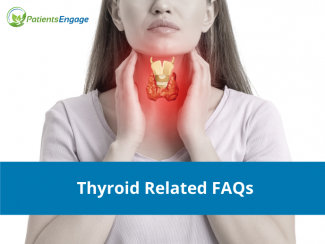
The thyroid gland plays a crucial role in controlling vital functions. There are multiple thyroid disorders. PatientsEngage addresses some of common and frequently asked questions on thyroid related issues.
The thyroid gland is one of the most essential glands in the body. It is fundamental to the functioning of several organs, such as the kidneys, liver, brain, heart, and even skin. The thyroid is a butterfly-shaped gland at the lower-front part of the neck, just below the Adam's apple. It is an endocrine gland made up of two lobes connected by an isthmus.
The production of hormones by the thyroid gland is responsible for regulating the metabolic rate, growth, and development of the body. It also plays a crucial role in controlling vital functions of the heart, muscles, and digestive system, as well as brain development and bone maintenance. The proper functioning of the thyroid gland relies on an adequate supply of iodine from the diet. Cells that highly specialize in extracting and absorbing iodine from the bloodstream produce these hormones, incorporating it into their production. Thyroid disorders can be caused by goiters (an enlarged bulge in the gland, usually because of iodine deficiency or autoimmune disease), chronic conditions like Graves' disease, or thyroid cancers.
The thyroid gland produces two major hormones that are regulated by a third feedback hormone:
- Thyroxine (T4). It contains four atoms of iodine.
- Triiodothyronine (T3) It contains three atoms of iodine.
- The pituitary gland, located at the base of the brain, produces Thyroid-Stimulating Hormone (TSH). This hormone controls the amount of T4 produced by the thyroid gland.
Thyroid-related issues can be caused by an underactive or overactive thyroid. Hyperthyroidism means that the thyroid gland is overactive and is producing the hormones T3 and T4 in excess of the body's requirements. Hypothyroidism means that the thyroid gland is underactive and is not producing the hormones T3 and T4 in adequate amounts to meet the body's requirements.
Common FAQs related to Thyroid
1. Are my symptoms related to or because of a Thyroid Disease?
Symptoms related to thyroid issues may be diverse and depend on whether the thyroid is underactive (hypothyroidism) or overactive (hyperthyroidism). Some symptoms that are common to both hypothyroidism and hyperthyroidism are:
- Menstrual changes (longer cycles, heavy or scanty bleeding, irregular periods).
- Sleep issues.
- Unusual Tiredness.
- Vague muscle aches and pains.
Symptoms specific to Hypothyroidism are:
- Fatigue.
- Weight gain.
- Intolerance to cold.
- Vague joint and muscle pain.
- Dry skin and/or thin, brittle hair and nails.
- Fertility issues.
- Slower heart rate.
- Sleep issues.
- Altered menstrual cycle.
Symptoms specific to Hyperthyroidism are:
- Fatigue.
- Weight loss, even with an increased appetite.
- Fast or irregular heartbeat.
- Nervousness, irritability, or agitation.
- Sleep issues.
- Tremors in the hands.
- Menstrual changes.
- Weakness of muscles.
- Intolerance to heat and/or excess sweating.
- Frequent bowel movements.
2. What are the other conditions that may mimic the symptoms related to Thyroid Conditions?
A thorough investigation should be carried out if you experience any of the above symptoms because many conditions have similar or overlapping symptoms. Let’s look at multiple conditions that can cause these symptoms.
- Fatigue: Conditions like fibromyalgia, depression, lack of exercise, anemia, and diabetes are some conditions that may be causes of fatigue and should be probed into.
- Weight changes: maybe because of diabetes, anorexia nervosa, bulimia nervosa, depression, cirrhosis, amyloidosis, or cancer.
- Intolerance to cold: maybe because of other issues like scleroderma, Raynaud's phenomenon, etc.
- Vague joint and muscle pain: maybe due to neurological issues, other autoimmune diseases, chronic fatigue syndrome, etc.
- Dry skin and/or thin, brittle hair and nails may also be due to nutritional deficiencies like iron and vitamin B12 and hormonal disbalance To read more about skin issues in thyroid disorders please see this.
- Fertility issues may be due to primary infertility (cause unknown) or due to secondary factors like infections, defects in the structure or functions of the concerned organs like uterus, ovaries or fallopian tubes, etc. To read more about fertility issues associated with thyroid disorders see here.Fast and/or irregular heartbeats may also be because of anxiety or pericarditis.
- Sleep issues: Other causes include Alzheimer's, depression, fibromyalgia, sleep apnea, and chronic fatigue syndrome.
- Altered menstrual cycle: It may also be because of hirsutism, Bulimia nervosa, endometriosis, etc.
- Nervousness, irritability, or agitation may also be caused by Alzheimer's, depression, or encephalitis.
- Weakness of muscles: may be due to other autoimmune diseases or neurological issues.
- Frequent bowel movements may also be due to IBD, IBS, etc.
3. How can I be certain that I do not have Thyroid Disease?
There are a few tests that are done to detect and confirm thyroid diseases.
The thyroid function test (TFT) is the most common test conducted to rule out thyroid issues.Thyroid function tests (TFT) are a series of blood tests used to measure how well your thyroid gland is working. Available tests include the T3, T4, TSH, TSI, and TPO.
Thyroid Stimulating Hormone (TSH): The amount of T4 produced by the thyroid gland is controlled by another hormone, which is made in the pituitary gland located at the base of the brain, called thyroid stimulating hormone.
T4 and TSH tests
The T4 test and the TSH test are the two most common thyroid function tests. They're usually ordered together.
Hyperthyroidism is suspected: If the TSH level is low and the FT4 result is high, this suggests an overactive thyroid (hyperthyroidism) that requires treatment. Learn more about hyperthyroidism tests here.
Hypothyroidism is suspected: If the TSH level is high and the FT4 (free T4 in the blood) result is low, this suggests an underactive thyroid (hypothyroidism) that requires treatment. Learn more about hypothyroidism tests here.
T3 Test
The T3 test checks for levels of the hormone triiodothyronine. It is usually ordered if T4 tests and TSH tests suggest hyperthyroidism. The T3 test may also be ordered if you are showing signs of an overactive thyroid gland.
TSI Test
TSI stands for thyroid-stimulating immunoglobulin. TSIs are antibodies that tell the thyroid gland to become more active and release excess amounts of thyroid hormone into the blood. A TSI test measures the amount of thyroid-stimulating immunoglobulin in your blood. Thyroid-stimulating immunoglobulins are usually indicative of Grave's disease. This is an essential test for all pregnant mothers to check for elevated levels.
TPO Test
Testing for thyroid antibodies, such as thyroid peroxidase antibody (TPO), is primarily ordered to help diagnose an autoimmune thyroid disease like Hashimoto's disease or thyroiditis (chronic inflammation of the thyroid) and to distinguish it from other forms of thyroid dysfunction. Thyroid peroxidase is the enzyme that helps convert T4 to T3.
Iodine uptake scan
A means of measuring thyroid function is to measure how much iodine is taken up by the thyroid gland. Cells of the thyroid normally absorb iodine from our blood stream (obtained from foods we eat) and use it to make thyroid hormone. Hypothyroid patients usually take up too little iodine, and hyperthyroid patients take up too much iodine.
Thyroid Antibodies
The body normally produces antibodies to foreign substances such as bacteria; however, some people are found to have antibodies against their own thyroid tissue. A condition known as Hashimoto's thyroiditis is associated with a high level of these thyroid antibodies in the blood.
4. If I am diagnosed with a Thyroid Disease, what are my treatment options?
The treatment would depend on the type and cause of the thyroid disorder.
Hypothyroidismis treated by prescribing supplements that act as a replacement for the thyroid hormone. A blood test is repeated around 6 to 8 weeks after starting the treatment to make any dose adjustments, and it is repeated after every dose adjustment. Once an optimal dose is reached, the test may be repeated in 6 months and then annually.
Hyperthyroidism is treated with:
- Medications: They may be antithyroid medications like methimazole or medications to treat the symptoms due to the overactive thyroid gland, like beta blockers.
- Radioiodine Therapy: It entails taking radioactive iodine-131 orally as a capsule or liquid. The radioiodine destroys the thyroid glands that are producing the excessive hormone. The downside is that almost everyone on this treatment will invariably develop hypothyroidism.
- Surgery: partial or complete thyroidectomy
5. How long should I take my medication for Hypothyroidism?
An underactive thyroid is a lifelong condition, so the supplement hormone levothyroxine will be prescribed for a lifetime with dose adjustments after regulated testing.
6. What are the potential side effects of medications given for Hypothyroidism?
Medication used for hypothyroidism is a synthetic form of the natural hormone produced by the body and is known to be safe for long-term use if given in the right dosage. In higher doses, it may cause osteoporosis over the long term.
7. How often do I need a blood test to monitor my thyroid function?
After the first prescription of levothyroxine for hypothyroidism, it should be checked after 2-3 months and thereafter every 6 months to 1 year, depending on the discretion of the doctor.
In cases of hyperthyroidism, commonly antithyroid medications and radioiodine are prescribed, following which initially the tests will be conducted frequently, and once the levels settle down, the doctor may ask for an annual test.
After any surgical removal of the thyroid gland, the thyroid hormone replacement is given (levothyroxine) and follows the same guidance as stated above for hypothyroidism.
8. Do thyroid disorders need surgery?
Thyroid cancer and thyroid nodules may require surgery for partial or complete removal of the gland.
9. What can I do beyond medications to manage my thyroid issue?
Hypothyroidism:
Consuming the Right Foods: Eating a balanced diet helps to keep weight gain in check. Iodine-rich foods like seafood, dairy, and iodized salt should be part of the diet. Selenium, found in nuts, whole grains, and lean meats, is known to help with stable thyroid functioning too. Limit your processed food intake. Cruciferous vegetables like broccoli, cabbage, cauliflower, and Brussels sprouts contain goitrogens that might affect thyroid function, and they may be avoided, although when cooked, their goitrogenic effects are lessened.
Regular exercise and adequate physical activity: Regular physical activity and exercise boost the metabolism and help with the optimal functioning of the thyroid.
Stress Management: Stress may also affect thyroid function. Including activities like deep breathing, meditation, or yoga is helpful.
Good sleep: Getting adequate and quality sleep helps the thyroid function better.
Maintain good hydration: It helps to boost the metabolism, which may be slowed down in hypothyroidism.
Avoid taking the thyroid medication with: walnuts, soybean flour, iron supplements or multivitamins containing iron, calcium supplements, antacids that contain aluminum, magnesium, or calcium., ulcer medicines like sucralfate, and cholesterol-lowering drugs containing cholestyramine.
Hyperthyroidism:
Consuming the Right Foods: Food items that are low in iodine, like egg whites, fresh fruit, oats, honey, etc., will reduce thyroid hormones. Consuming cruciferous vegetables prevents the thyroid from utilizing all the iodine available in the body. Take an iron-rich diet, as low iron levels are associated with hyperthyroidism. Selenium, found in nuts, whole grains, and lean meats, is known to help with stable thyroid functioning too. Consuming vitamin D and calcium-rich foods may help protect the bones, as hyperthyroidism often weakens them.
Regular exercise and adequate physical activity: Regular physical activity and exercise boost the metabolism and help with the optimal functioning of the thyroid.
Stress Management: Stress may also affect thyroid function. Including activities like deep breathing, meditation, or yoga is helpful.
Good sleep: Getting adequate and quality sleep helps the thyroid function better.
Avoid taking: Avoid any supplements containing iodine, and do not take any food supplements containing an amino acid called tyrosine, as it is a precursor to thyroid hormones.
10. Can Thyroid Issues be prevented?
- Consume a nutritious diet that is low in sugar and processed foods For hypothyroidism one may consume a diet rich in iodine and selenium which is found in some fortifies food items and fish, eggs, meat and milk.
- Limit your intake of cruciferous vegetables: vegetables like cabbage and broccoli can interfere with thyroid hormone production when consumed raw or in excess.
- Reduce stress: Stress may contribute to thyroid hormone resistance.
- Regular exercise helps boost the metabolism and keep hormones in check.
- Maintain a healthy body weight.
To read more about prevention of hyperthyroidism see here.
To read more about prevention of hypothyroidism see here.
11. Can I exercise if I have a thyroid issue?
Engaging in regular physical activity can assist in symptom management of hypothyroidism while enhancing overall well-being. Exercise supports weight management, enhances heart health, uplifts mood and energy levels, strengthens bones, regulates blood sugar, and sustains both strength and flexibility.It is important to check with your doctor first before starting any new physical activity/exercise.
12. What is the role of Physiotherapy in managing thyroid related issues?
Physiotherapy can be beneficial for individuals with thyroid issues. It focuses on exercises and techniques to improve muscle strength, flexibility, and overall physical well-being. Symptoms based, targeted and tailored physiotherapy can assist in managing symptoms such as muscle pain, stiffness, and fatigue commonly associated with thyroid conditions. Consultation with a healthcare professional can help determine the appropriate physiotherapy interventions based on individual needs and symptoms.










